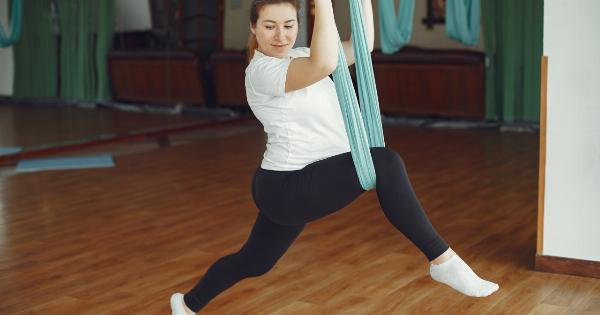Pregnancy is a time of immense physical and emotional changes for a woman. It is important to maintain a healthy lifestyle during this period, and exercise plays a vital role in achieving that goal.
Many women may be hesitant to engage in physical activity during pregnancy due to concerns about the safety of the mother and the baby. However, numerous studies have shown that regular exercise during pregnancy can have numerous benefits for both the mother and the developing fetus.
1. Increased Energy Levels
One of the most common complaints during pregnancy is fatigue. The extra weight and hormonal changes can make everyday tasks feel exhausting. However, engaging in moderate exercise can provide a natural energy boost.
Regular physical activity enhances blood circulation, improves oxygen delivery, and increases the production of endorphins, the “feel-good” hormones. These physiological changes lead to increased energy levels, helping pregnant women tackle daily routines with greater ease.
2. Improved Mood and Mental Well-being
Pregnancy brings about a rollercoaster of hormonal changes, which can significantly impact a woman’s emotional well-being. Mood swings, anxiety, and depression are not uncommon.
Exercise, however, has been shown to be a powerful tool in managing these emotional fluctuations. Physical activity promotes the release of serotonin, dopamine, and norepinephrine, which are neurotransmitters responsible for regulating mood and reducing stress.
Regular exercise can also promote better sleep patterns and increase overall mental well-being.
3. Decreased Pregnancy Discomfort
As the pregnancy progresses, women often experience various discomforts such as back pain, swollen ankles, and constipation. Exercising regularly can help alleviate these discomforts.
Strengthening and stretching exercises, such as prenatal yoga or swimming, can relieve muscle tension, improve posture, and reduce back pain. Additionally, staying active supports healthy circulation, which aids in reducing swelling and preventing constipation.
By incorporating exercise into their routine, pregnant women can alleviate common pregnancy discomforts and improve their overall quality of life.
4. Enhanced Strength and Endurance
It is no secret that pregnancy puts additional strain on a woman’s body. As the baby grows, the mother’s body has to adapt and support the increasing weight.
Regular exercise during pregnancy helps build strength and endurance in the muscles required to carry the extra load. Strengthening the core muscles, including the abdominal and back muscles, can better support the spine and reduce back pain.
Furthermore, improved muscular endurance can prepare women for the demands of labor and make the postpartum recovery period less challenging.
5. Prevention of Excessive Weight Gain
Weight gain during pregnancy is natural and expected. However, excessive weight gain can increase the risk of gestational diabetes, high blood pressure, and complications during labor.
Engaging in moderate exercise helps maintain a healthy weight gain throughout pregnancy. Physical activity burns calories, helps control appetite, and boosts metabolism. Moreover, exercise increases the body’s insulin sensitivity, reducing the likelihood of developing gestational diabetes.
By managing weight gain effectively, pregnant women can reduce the chances of pregnancy-related complications and promote a healthier pregnancy.
6. Reduced Risk of Gestational Diabetes
Gestational diabetes is a type of diabetes that occurs during pregnancy. It can lead to various complications for both the mother and the baby. Regular exercise has been shown to decrease the risk of developing gestational diabetes.
Physical activity helps the body utilize glucose effectively and improves insulin sensitivity, thereby maintaining stable blood sugar levels. However, it is important to consult a healthcare provider before starting an exercise routine, especially if there are pre-existing health conditions or any concerns.
7. Shorter Labor and Quicker Recovery
Labor is a physically demanding process. Regular exercise during pregnancy can help women prepare for childbirth and potentially have a shorter labor. Stronger muscles, especially the pelvic floor muscles, can assist in pushing during delivery.
Additionally, being physically fit reduces the chances of requiring interventions such as a cesarean section. After childbirth, women who have maintained an active lifestyle during pregnancy tend to have quicker recoveries. Their bodies are more resilient and can bounce back faster.
8. Improved Sleep Quality
Sleep disturbances are common during pregnancy due to hormonal changes, physical discomfort, and increased anxiety. Regular exercise can improve sleep quality and help pregnant women achieve more restorative sleep.
Physical activity relieves stress and tension and promotes relaxation. However, it is essential to avoid exercising too close to bedtime to allow the body to wind down before sleep.
9. Lower Risk of Pregnancy Complications
Exercising during pregnancy can reduce the risk of developing certain complications.
Research suggests that staying physically active helps lower the risk of developing conditions such as preeclampsia, gestational hypertension, and venous thromboembolism. Additionally, regular exercise promotes healthy blood pressure levels and improves cardiovascular health.
10. Positive Impact on Fetal Development
The benefits of exercise extend beyond the mother’s well-being and can positively impact the developing fetus.
Studies have shown that when pregnant women exercise, their babies may experience lower heart rates during labor, enhanced neurobehavioral maturity, and improved cardiovascular health. Maternal exercise is also associated with a reduced risk of the baby developing childhood obesity and related conditions later in life.
Incorporating Exercise Safely During Pregnancy
Before starting or continuing an exercise routine during pregnancy, it is crucial to consult a healthcare provider. They can provide personalized advice based on individual health and pregnancy conditions.
In general, low-impact activities such as walking, swimming, stationary cycling, and prenatal yoga are safe options for most pregnant women. It is important to listen to the body, avoid strenuous exercises, stay hydrated, dress comfortably, and wear appropriate footwear.
In conclusion, exercising during pregnancy brings numerous benefits for both the mother and the baby.
From increased energy levels and improved mood to decreased discomfort and prevention of excessive weight gain, regular physical activity plays a crucial role in maintaining a healthy pregnancy. With proper guidance and precautions, pregnant women can safely enjoy the positive impact that exercise can have on their physical and emotional well-being.




























